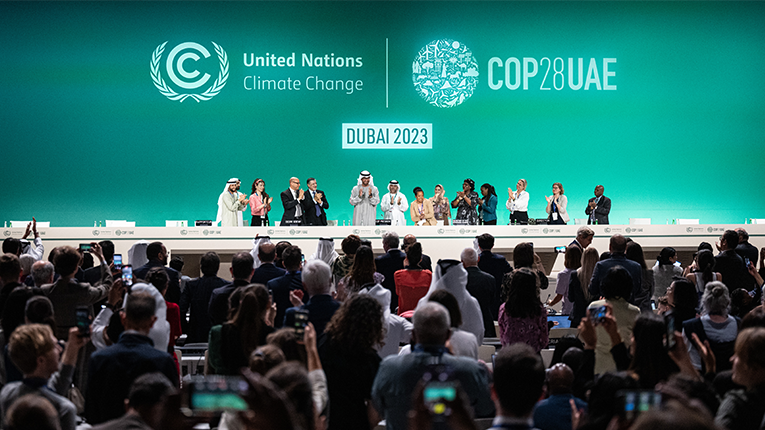
By Satya Tripathi January 16, 2024
The 28th session of the Conference of the Parties (COP28) to the United Nations Framework Convention on Climate Change (UNFCCC) will be a pivotal event in the global climate action agenda. The latest IPCC assessment report published earlier this year highlighted how we are significantly behind the target to maintain global temperature rise within 1.5 degrees Celsius. This reality places a heavy responsibility on policymakers to enact bolder and decisive action to put us back on course. COP28 will also witness the conclusion of the inaugural global stocktake, or “the climate
check-up.” Preliminary findings from its synthesis report already underscore the global community’s shortfall in reducing emissions by collectively cutting 22 gigatons of GHG emissions per annum within the next 7 years. It is evident that we stand on the brink of an irreversible crisis, where any delay of decisive climate action could irreversibly damage the living fabric of the planet.
Based on the two latest scientific insights of the IPCC and the global stocktake assessment, COP28 is confronted with significant challenges. This year’s climate dialogue will center on some core issues, such as curbing emissions by 2030–which includes phasing out fossil fuels and accelerating the shift to renewable energy–reshaping the current climate finance system, and fostering collective and
inclusive climate action. Additionally, the conference also ought to prioritize the
integration of climate resilience into development strategies, adaptation measures enhancement for vulnerable communities, a commitment to ecosystem conservation, and holistic solutions on food, agriculture, health, water, relief, and recovery.
We are witnessing progress and political momentum from world leaders and the global community to pursue solutions to climate problems. Notably, the G20 has made
incremental yet meaningful steps in addressing climate change, followed by a commitment to accelerate investment in climate-resilient food systems. At the United Nations General Assembly (UNGA) and NYC Climate Week 2023, we observed some significant climate commitments by key stakeholders. The efforts undertaken in these pre-COP28 meetings serve to accelerate our efforts toward preventing the bigger catastrophe caused by climate change.
Moreover, there have been some works done on the communal level. Initiatives like the Lifestyle for Environment (LiFE) that started in India, which encourages sustainable
living through individual and collective behavioral shifts, have demonstrated huge potential to expedite climate action. Although individual action may not yield a substantial change, a collective power coupled with appropriate incentives, supporting infrastructure, and policies that support a circular economy, can offer a profound solution to the climate issues. This approach becomes particularly impactful when scaled up on a global scale.
Communal efforts have also made a mark in addressing climate change, as seen in the community-managed regenerative agriculture/natural farming initiative in Andhra
Pradesh, India. This region, once the birthplace of India’s first “Green Revolution” state
and associated with significant biodiversity loss and ecosystem disruption, has now emerged as the country’s pioneer in natural farming. Managed by smallholder farmers, this initiative has turned the tide by not only sequestering carbon and restoring the ecosystem, but also providing the community with employment, better incomes, reduced farming costs, and food security without the expense of destroying natural resources. It has proven that smallholder farming can be economically sustainable, enhancing both farm and ecosystem services. This remarkable shift towards sustainable agriculture could, if scaled up, serve as a blueprint for a globally adaptable, inclusive, and sustainable agricultural model that effectively reduces climate vulnerability.
Both examples above underscore that, in addition to the essential transition to clean energy, grounded approaches such as a shift to a circular economy framework using communal efforts, are also crucial to rejuvenating the web of life. Continued investment in human development will lower people’s risk and vulnerability to climate change,
leading to meaningful outcomes.
Addressing climate change demands a paradigm shift towards regenerative development goals – a strategy that goes beyond merely reducing environmental damage to actively restoring our ecosystem. Yet, the urgency of this transition is hindered by a significant shortfall in funding, despite the narrowing window of opportunity. Without adequate investment, even the most innovative climate action plans remain unrealized. This is where sustainable finance comes into play, bridging the gap between ambition and action. Developing countries need about $2 trillion annually to achieve their net-zero emission goals.
COP28 has the potential to act as a powerful catalyst for this people-planet coalition. A virtuous partnership is key to unlocking this huge potential. Collaborative action helps manage risks more effectively, leading to reduced capital costs, and ultimately, unlocking substantial investments. By shifting the mindset, investment in sustainable projects can become a strategic tool for a resilient and thriving global economy.
COP28 offers an opportunity to redefine our climate narrative by championing proactive and innovative solutions. As world leaders, investors, activists, and the public converge, the message is clear: the time for incremental steps is over. We must leap forward with bold, decisive action that will let COP28 be remembered not just for the promises made, but for the concrete actions taken, the partnerships forged, and the transformative journey the world embarks upon.
By Antonios Vouloudis January 16, 2024
By Satya Tripathi January 16, 2024
By Ronika Postaria September 22, 2022
by Asmeeta Das Sharma, September 22, 2022